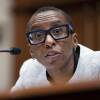Conservative activists want to make this clear: Tuesday's resignation of Harvard President Claudine Gay was not an accident. She was not punished for bad behavior or mismanagement. Instead, Gay's departure was the culmination of their campaign of vilification in pursuit of a larger goal of dismantling DEI programs in academia.
Christopher Rufo of the right-leaning Manhattan Institute has led the charge. Rufo is best known for turning the legal study of critical race theory into a pejorative catch-all phrase for all areas of education that addresses the role of structural racism in American society. His new target is DEI — or diversity, equity and inclusion — programs in higher education. Rufo and his Manhattan Institute colleague Ilya Shapiro said their larger goal in toppling Gay is eradication of DEI programs on college campuses.
“She’s the crystallization of a lot of the critique of distrust in and general dissatisfaction with higher education,” Shapiro told GBH News. “She's the apotheosis of an anti-intellectual movement that values DEI, identity and activism over truth-seeking, merit and education,” said Shapiro — suggesting that her appointment could be attributed to her race and gender rather than her “mediocre” credentials.
In her resignation letter, Gay wrote that, in recent weeks, it’s been “frightening to be subjected to personal attacks and threats fueled by racial animus.” Many of her supporters agree. Janai Nelson, the president of the NAACP Legal Defense Fund, referenced the campaign to take down Gay on X, formerly Twitter . “The project isn’t to thwart hate but to foment it thru vicious takedowns. This protects no one.”
That campaign began even before the Washington Free Beacon questioned the veracity of Gay’s academic writings and derided her as a plagiarist.
Gay, who took up the post as Harvard president last summer, has been under intense scrutiny since the Oct. 7 Hamas attacks on Israel. Several Harvard student groups put out a statement that was widely condemned as antisemitic, and alumni, donors and other critics took issue with what they saw as Harvard’s slow response.
Then came a congressional hearing into antisemitism on college campuses that almost immediately prompted the resignation of University of Pennsylvania President Liz Magill over her failure to forcefully reject antisemitic speech. Gay was similarly criticized, but the university's leadership stood behind her.
Only later did improper citations in her academic work cited come to light, along with allegations of plagiarism from the ’90s and ’00s that eventually contributed to her resignation Tuesday.
Rufo, writing on X, was explicit about how he and others planned her “takedown.”
“We launched the Claudine Gay plagiarism story from the Right. The next step is to smuggle it into the media apparatus of the Left, legitimizing the narrative to center-left actors who have the power to topple her. Then squeeze,” he wrote on Dec. 21.
In a New York Times op-ed Wednesday afternoon, Gay said the campaign against her was based on a fear of racial diversity.
“It is not lost on me that I make an ideal canvas for projecting every anxiety about the generational and demographic changes unfolding on American campuses: a Black woman selected to lead a storied institution,” she wrote. “Someone who views diversity as a source of institutional strength and dynamism. ... Someone who believes that a daughter of Haitian immigrants has something to offer to the nation’s oldest university.”
Rufo celebrated her resignation as “the beginning of the end for D.E.I.”
But some see her ouster as a symptom of dangerous government intrusion into how private institutions conduct themselves, with a congressional inquiry into Harvard’s conduct playing a role in her stepping down.
“I do not know what more it will take for people to understand that this is not just a culture war,” Khalil Gibran Muhammad, the Ford Foundation Professor of History, Race, and Public Policy at Harvard Kennedy School, told GBH News. “We are facing an existential threat to the basic ability to have firewalls around our capacity to have run our institutions — without government intrusion — in the way that the Republican Party is insisting on upholding their vision of this country.”
A spokesperson for Harvard declined to comment.
The Supreme Court overturned affirmative action programs last summer, which experts widely expect will reduce racial diversity on college campuses. University and state officials rushed to affirm that diversity would still be a priority in college admissions. Gov. Maura Healey and Attorney General Andrea Campbell issued guidance to colleges in the fall that laid out avenues to take a more holistic look at applicants.
But the path forward has been less clear for efforts that support staff and students of color on campus.
Shapiro hopes universities will eliminate DEI efforts from their institutions to rescue higher education from what he calls a "crisis.”
“I don’t think this is rocket science. You abolish DEI structures,” Shapiro said. “You fundamentally get back to the core truth-seeking mission and educational mission of these universities, rather than indoctrinating social justice activism.
“University leaders and faculty are going to have to be dragged kicking and screaming,” he continued. “That’s why these external shocks are so important, whether it be from donors, trustees, the media, politicians or anyone else. But ultimately, that is what is necessary to put higher ed back on the right track.”
Many conservative politicians are trying to curtail diversity and inclusion efforts, particularly in colleges. Florida Gov. Ron DeSantis signed a bill last May effectively eliminating DEI initiatives at public universities . Rufo was among a group of national conservatives advising DeSantis on this course of action. A similar ban in Texas, under Gov. Greg Abbott, soon followed .
Other conservative advocacy groups then turned their sights to employment-related diversity efforts, like at law firms — creating another sore point of controversy. Attorney General Campbell condemned the efforts of 13 attorneys general in other states to limit DEI initiatives at private companies, writing, “The Supreme Court’s decision to outlaw affirmative action has no effect on private companies’ efforts to recruit a diverse applicant pool and ensure that workplaces are welcoming and supportive of people of all backgrounds.”
But Shapiro hopes that, at least in higher-ed institutions, diversity, equity and inclusion initiatives are coming to an end.
“When it comes to higher ed, people are discovering ... that these DEI structures are not kind of a kumbaya, holding hands and celebrating diversity together, but rather are noxious and toxic centers that undermine the basic mission of institutions of learning,” Shapiro said. “Not to mention classical liberal values like free speech and due process and treating everyone equally.”
Muhammad sees irony in the campaigns against Claudine Gay, and by extension DEI, by right-wing activists who cite concern for free speech as a motivating factor.
“The very people who claim to stand up to liberty and freedom, the very people who claim the government is too big and too intrusive, are precisely the people weaponizing the federal government through congressional leaders to decide what and how Harvard should teach students,” he said.









